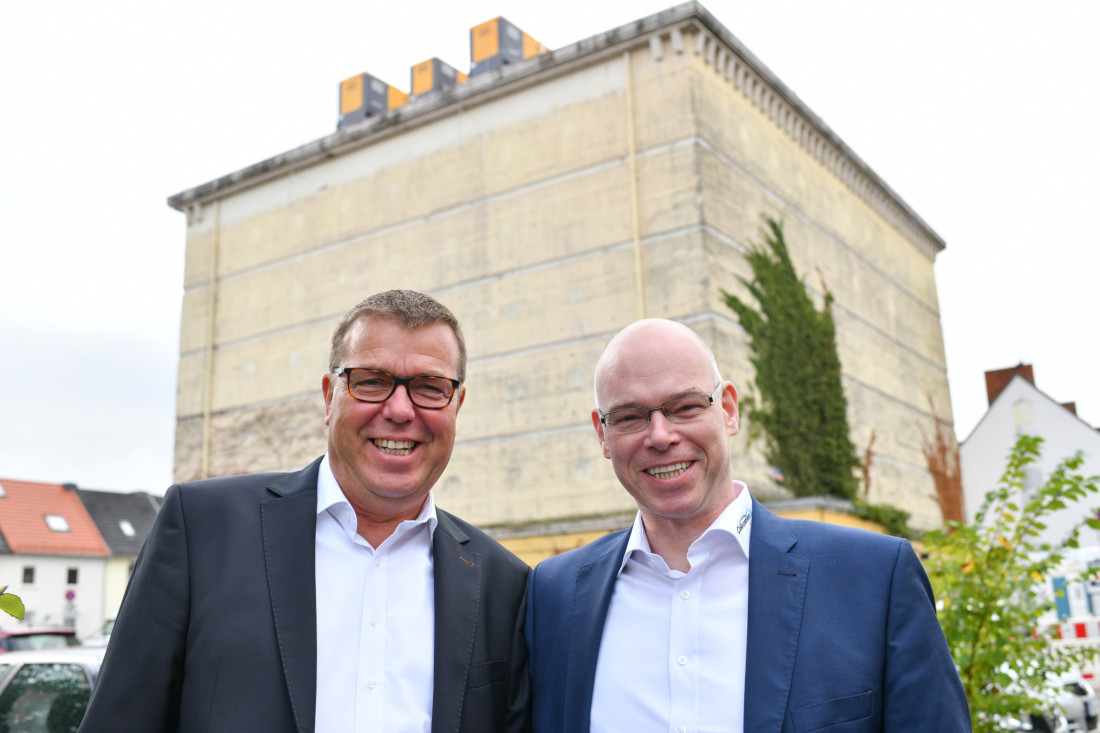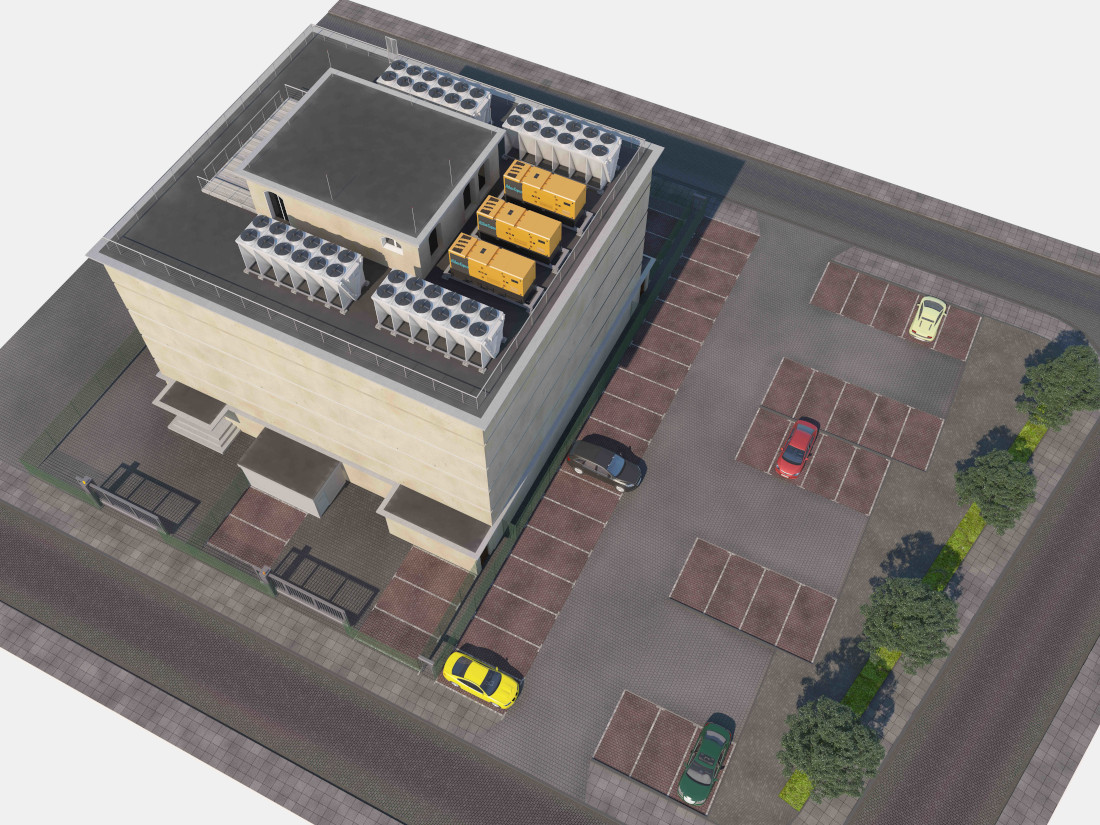How a bunker in Bremen has become one of Germany’s most secure data centres
DigitizationHow a bunker in Bremen has become one of Germany’s most secure data centres

IT service provider Consultix operates one of Germany’s most secure state-of-the-art data centres in a bunker in Bremen. Companies can rent rack space, run their own cloud services and securely store their data here.
A grey giant rises above Bremen’s Westend district. More than 5,000 tonnes of reinforced concrete dominate the surrounding area in the centre of the city. A monument to unhappier days gone by. Today, it is one of Germany’s most modern and secure data centres. The exterior of this World War Two bunker gives few clues as to the new high-tech installations within.
But appearances are deceptive, as even Tom Cruise in Mission Impossible would struggle to break in here. Biometric security, metal detectors, turnstiles, transponders secured by code and 24/7 video surveillance – nobody gets in here without authorization. Even brute force is not a solution, as the two-metre thick walls made of reinforced concrete could withstand the impact of a passenger aircraft. Anyone trying to break in will be stopped dead in their tracks by the RC6-certified security doors.
“Our data centre conforms to Tier 4, the highest security category,” says Andres Dickehut, CEO of Consultix, a Bremen-based IT services provider. He can talk for hours about security measures, and does so with enthusiasm. For example, about the low oxygen content in the air that minimizes the risk of fires, or about the ten self-contained security zones in the bunker. Or about the eye-wateringly expensive intrusion prevention system that repels online attacks.

Storing data securely is a full-time job
So, why the big effort? It is all to protect the 500 server racks spread across five levels in the ColocationIX data centre, where companies can securely store their data. This is called private cloud storage. In contrast to the public cloud familiar from Google Drive, Dropbox or the Apple icloud, in a private cloud, companies manage their data on systems that are only used by them. This increases security, as they can install their own hardware and software in the rack and operate their services from here. “There are only a few companies that can store their data as securely on their own premises,” Dickehut says confidently.
Private or public cloud storage – which is the one for you?
On the face of it, this business model appears to have a lot of competition. Microsoft, Amazon and Google dominate the cloud market and can offer low prices and straightforward installation and operation of systems. And are earning billions from it.
This convenience does have its drawbacks, though. “At first glance, the low rates are attractive. But the basic package is often insufficient, and additional functions can quickly become expensive. Any company looking to achieve the same level of protection that we offer will soon pay more than for a server rack in our bunker,” Dickehut says.
To keep costs down, probes were sunk up to 200 metres into the earth beneath the bunker to provide carbon-neutral cooling for the data centre. In addition to an extra level of resilience, this system produces savings that Dickehut can pass on to his clients. The cooling system was a joint development between Consultix and the Resilient Energy Systems department of the University of Bremen.
The confidence of knowing what is happening with your data
There is certainly one area where the data centre beats the competition in Silicon Valley hands down – data protection. “If you use Google or Amazon, your data will be transferred to the US and to US companies. Anyone using these services needs to be aware that they are making themselves dependent. Critical company data should never be uploaded to the public cloud,” Dickehut emphasises. “Companies that operate their systems in a local data centre know what is happening on their servers.” The data centre complies with the GDPR and is ISO 27001 audited, of course.

A view over Bremen from the sky lounge on the roof
Customers in (north) Germany, in particular, want to know where their data is stored. That was one of the reasons why Consultix created a lounge area on the roof of the bunker. Dickehut and his 100-strong team welcome customers here, who have the opportunity to experience the security measures for themselves during their visit.
The services provided by ColocationIX are targeted at large and medium-sized enterprises that want to install their own IT technology. Companies that need to conform to Germany’s Critical Infrastructure Protection Law (BSI-KritisV), in particular, will find a safe haven for their data here. For companies that are not using their own hardware, Consultix can supply racks and install hardware and software, just like a conventional public cloud provider.
The digital Silk Road
Companies that do business in China will be particularly interested, as the bunker has a direct fibre optic connection to the Land of the Dragon, a digital Silk Road. It provides a fast and low-cost connection and has been designed to offer high resilience. Hosting in Bremen is also a lot simpler than renting a data centre in China, according to Dickehut. This also prevents service disruption caused by Chinese state intervention, which would affect larger providers such as Google or Amazon more easily.
Bremen is the perfect site for infrastructure that is critical to security
It took Dickehut six years of planning and construction to get this far, and Bremen was the obvious choice as the site. “There is no risk of earthquakes in Bremen and there are few storms or natural disasters. Thanks to our location near the TV tower in the city, we have a direct fibre optic connection to major internet exchange points in Amsterdam, Frankfurt and London. This would be a lot more difficult in a rural area.” Bremeninvest provided assistance with finding a suitable site and securing funding, and arranged contacts with strategic partners, including energiekonsens and the University of Bremen. “We would never have got this off the ground without the valuable support of Bremeninvest. They gave us the right advice at the right time,” says Dickehut.
Contact Ray Ivens, project manager region Bremen West, +49 (0) 421 9600-223, ray.ivens@wfb-bremen.de, for more information on settlement and companies in the west of Bremen.
Our services for the digitilization of your company can be found on the digitisation overview page.
Success Stories
“After all, we're here because someone else made room for us, and it's our duty to do the same for others”
Theoretical physicist, industrial mathematician, manager – as a member of the start-up company TOPAS, Dr. Shruti Patel creates change in Bremen. However, being a role model has not always been easy for her.
Learn more12 Examples of AI in Medicine and the Health Sector
Detecting cancer earlier or avoiding accidents at work - AI will make our lives easier and easier in the healthcare sector. In Bremen, a strong AI landscape is developing in the healthcare sector, as these 12 examples show.
Learn moreThese Bremen companies are developing autonomous systems
Self-driving cars, drones, robots - in Bremen, autonomous systems are a focus of numerous focus of numerous companies. A look at the diverse corporate landscape and where the committed players can be found.
Learn more